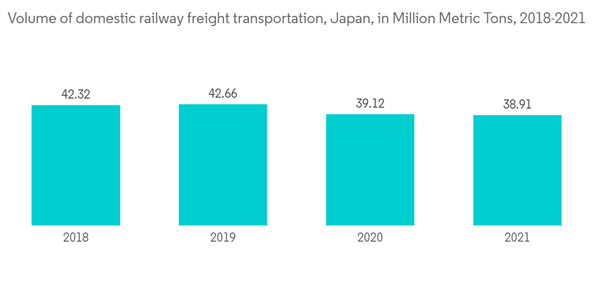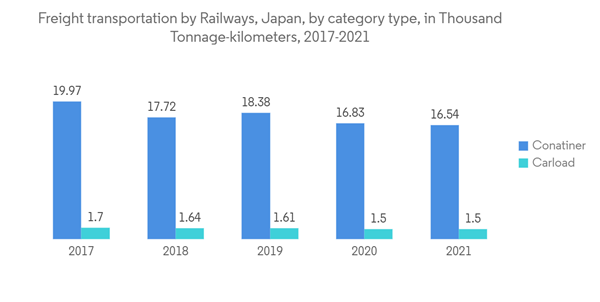Key Highlights
- Additionally, compared to autos, trains have extraordinarily high kinetic energy efficiency and have a very minimal environmental impact. JR Freight estimates that one freight train (26 cars) is equivalent to 65 10-ton trucks, demonstrating the extraordinarily high transportation efficiency of railways, which can move massive volumes of cargo at once.
- The TOYOTA LONGPASS EXPRESS is one well-known illustration. Toyota owns this freight train, which travels 900 kilometers between Nagoya and Morioka and transports auto parts made at its facility in Aichi Prefecture to its facility in Iwate Prefecture. Transporting 40 10-ton truckloads at once, according to the firm, is now achievable thanks to the changeover from truck to rail transportation.
- Every day, 737 freight trains run across the nation on average. 425 of them are container trains, and the remaining trains transport heavy cargo in tankers and hoppers. These freight trains cover a total daily distance of around 240,000 km. JR Freight transports 90% of its train cargo at night. Even thoughthe fact that JR Freight and the six JRs use the same tracks and catenaries as well as the same rail infrastructure, they are all controlled by the JRs. Despite not paying track usage fees, JR Freight is nonetheless liable for any additional expenditures incurred as a result of running freight trains on these tracks.
- Japan's 150-year-old tradition of developing sophisticated railway technology and knowledge should now be able to propel the growth of sustainable railway systems around the world. Railways are crucial for a sustainable modal shift away from road travel because they have the potential to form the foundation of any future sustainable transport system.
Japan Rail Freight Transport Market Trends
Increase in demand for sustainable transport of goods driving the market
Tokyu is setting the standard as the first Japanese train company to run 100% of its operations on renewable energy. However, other business owners are also contributing to the reduction of emissions in the sector. Tobu Railway, Japan's second-largest rail operator by distance covered, announced plans to run its special express services between Tokyo and the resort town of Nikko using renewable energy beginning in April. This was in response to Tokyu's vow. Similarly to this, Tobu stated in November 2021 that it will buy a new fleet of trains from Hitachi Rail that, when put into service in 2023, will cut CO2 emissions by up to 40%.The largest rail business in Japan, East Japan Railway Company (JR East), has also maintained that it will increase its usage of renewable energy throughout all of its activities to comply with Japan's commitment to reduce greenhouse gas emissions to zero by the year 2050. The efforts of such businesses will be essential to achieving the net-zero goal because JR East alone consumes an estimated 5 billion KWh across its train operations, stations, and office buildings, which is comparable to 1.4 million households.
One of the biggest commercial logistics firms in Japan, Seino Holdings Co. Ltd. has been around for about 90 years. A new partnership to operate non-container "break-bulk" cargo trains between Nagoya in Aichi Prefecture and Fukuoka in Fukuoka Prefecture in March 2021 and between Tokyo's Shinagawa and Higashi Fukuyama in Hiroshima Prefecture in October 2021 was launched by Seino Transportation, Japan Freight Liner, and Japan Freight Railway in 2021. Seino Transportation trucks deliver the goods to the stations, Japan Freight Liner loads them onto freight trains, and Japan Freight Railway transports them. Together, the two routes that these freight trains travel on can reduce emissions by 13,805 tons yearly.
Increasing domestic and cross-border rail freight transportation supporting the market
A new intermodal service from Japan to Uzbekistan through China and Kazakhstan has been introduced by FESCO Transportation Group. Its name is FESCO Trans China Railway, and it connects the nations by combining rail and water. The service covers sea transportation from the port of Yokohama in Japan to the port of Lianyungang in the Chinese province of Jiangsu. The containers are then carried by rail from this point. To reach the border with Kazakhstan, this route passes via China at Khorgos. The containers are reloaded onto the 1520 gauge network at this border and then railroaded to their final destination, the Chukursai terminal in Tashkent, Uzbekistan.The first block train operated by Maersk between the UK and Japan landed in Felixstowe on March 2021. As part of Maersk's AE19 service, the train carrying forty 40-foot containers departed from Yokohama in January and travelled via Russia along the Trans-Siberian route. The new block train was run in collaboration with railroad company Modul, which has been a longtime partner of Maersk in AE19 since 2019. Maersk now provides three weekly departures through AE19 in addition to the new train service, and mostly transports products between North-East Asia and Northern Europe. Additionally, Maersk thinks that rail shipments between Japan and Europe will keep growing in 2021 due to the multiple difficulties that maritime transit suffers as a result of Covid-19.
Japan Rail Freight Transport Market Competitor Analysis
The Japan Rail Freight Transport Market is fairly consolidated with a few local, regional and global players. Some of the major players include Japan Freight Railway Company (JR Freight), Nippon Express Co., Ltd., Kamigumi Co., Ltd., AZ-COM Maruwa Holdings Co., Ltd., Yusen Logistics Co., Ltd., and many others. The sustainable transformation of Japanese railways and transportation of goods through intermodal logistics throughout Japan and internationally is attracting other companies to enter the market. However, rail freight transportation needs attention in Japan so that better services can be provided to consumers.Additional Benefits:
- The market estimate (ME) sheet in Excel format
- 3 months of analyst support
Table of Contents
Companies Mentioned (Partial List)
A selection of companies mentioned in this report includes, but is not limited to:
- Japan Freight Railway Company (JR Freight)
- Nippon Express Co., Ltd.
- Kamigumi Co., Ltd.
- AZ-COM Maruwa Holdings Co., Ltd.
- Yusen Logistics Co., Ltd.
- FESCO
- MAERSK
- Seino Transportation Co. Ltd.
- Japan Freight Liner Co.
- Japan Freight Railway Co.










